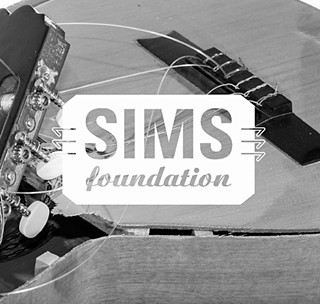This time 15 years ago, Steven Ray Will was thinking about ending it. He’d been pushing down past trauma, self-medicating with pills and alcohol. He was walking down Barton Springs one day in October 2009 when he collapsed on the street.
“I was crying and I just couldn’t pull myself together,” he recalls. “I just felt like that was it. That was the end. I was just trying to figure out how I was going to go out.
“And I remembered that SIMS was a thing.”
In a “shot in the dark,” the former performing artist and current tour manager/6 String Ranch producer called the local nonprofit, which connects members of the Austin music scene with free or low-cost counseling, psychiatric, and substance abuse services. The voice on the other end of the line talked to him for an hour, calmed him down, and later connected him with a counselor who would help him get sober.
“Right there in [that] moment, [SIMS] turned my life around,” Will says now. “I don’t know if I would be here without them.”
For the next three months, a local musician in the same shoes Will filled years ago might not receive the same help. Due to a lack of funds, the SIMS Foundation announced last month, services for almost all of its 500-plus clients will be on pause from Nov. 1 through Jan. 31 as the nonprofit undergoes a “strategic planning process.” As an exception, clients approved for weekly counseling sessions will still be allowed one SIMS-provided appointment per month.
“The reality is simple: we need more funding to continue to operate at our current service levels, and we need to restructure our service model to ensure that we are maximizing all of the resources and efficiencies that are now available,” SIMS Board Chair Marissa Rivera wrote in an announcement posted online Oct. 22.
“I didn’t know that they needed more funding,” says Paige DeChausse, who fronts the bluesy quartet the Reverent Few. She started therapy through SIMS about a year ago, after her fiancé/bandmate’s father was diagnosed with ALS and her mother was diagnosed with early onset Alzheimer’s. “There was a lot of overlapping grief that was hard to unpack,” she says. More recently, the two added couples therapy to the mix, which DeChausse says she’s been loving ahead of their wedding in February.
“And so when I saw that email from SIMS come in, I was like, ‘Oh my gosh, I’m making all this progress,’” she says. “’What’s going to happen now?’”
SIMS paused enrollment for new clients to its substance abuse and psychiatric care programs last fall, citing funding issues. Enrollment reopened in January 2024, but the nonprofit paused it again in August. Care for current clients wasn’t affected.
“I really, honestly don’t know what I would do without SIMS. It truly saved my life.” – Musician Britny Lobas
When asked by the Chronicle why SIMS didn’t make its need for emergency funding public, the organization said: “Over the past several years, SIMS has experienced fluctuations in funding and donations, like many nonprofits, with the bulk of our annual income coming in during the final quarter of the year. Despite this, we have never taken action to revise our service model before in order to improve the sustainability of our operations. Today, under new leadership, we are very excited to be addressing some of the structural issues that will help us reach a new level of sustainability and impact in the future.”
Patsy Bouressa, SIMS executive director since 2019, left the nonprofit in January 2024. Derrick Lesnau took over as CEO in May.
Pop-rock songwriter Britny Lobas sought out therapy to help her recover from life-threatening alcoholism. “I was in the ICU in 2022 for 16 days because of organ failure and pancreatitis,” she says. “And SIMS really saved my life, because when I got out, I had no idea how to live a sober life.” Lobas speaks lovingly of her therapist Joane, who “was there when I got out of the hospital and helped me in my first couple weeks of sobriety, which were so hard.” She’ll be two and a half years sober next month.
SIMS told clients they’d help them find “alternative care” during the pause, and the nonprofit’s public statement said clients would be able to “maintain an ongoing relationship with their SIMS provider at a significantly discounted rate” should they opt to pay out of pocket. Both of DeChausse and Lobas’ providers – just as blindsided by the pause announcement, the artists say – were willing to strike a deal with their clients, allowing them to shift from bimonthly to monthly appointments at a lower rate than what therapy would normally cost for the uninsured.
That likely won’t last forever, though. Lobas says Joane is willing to work with her through the end of the year, but after that will require insurance – and she doesn’t accept the provider Lobas has. “I don’t know what I’m gonna do next year, honestly,” the musician says. “We’ve built this relationship. I’ve seen her since 2018 … I really don’t want to see anyone else.”
Will is no longer a SIMS client, and DeChausse and Lobas feel better equipped to handle the service pause thanks to the help they’ve already received. They’re more worried about the friends they have who still need intensive services.
“[I know] some people that are really in the trenches and [SIMS’ care is] vital to their sustainability,” DeChausse says. “I feel lucky that for me, I’m in a better mental place now than maybe I was 10 years ago. I don’t know if I would have received therapy so openly [then], but I have so many friends that love SIMS and utilize them on a weekly basis.”
In Rivera’s letter, the board chair said SIMS would need to raise $480,000 by the end of November in order to maintain its current service levels for the next three months. The organization has since launched a fundraiser called Restore the Rhythm, which seeks $500,000 – though there’s been a curious lack of promotion for the cause. The initiative had raised just over $100,000 as of press time Wednesday.
(Update: In an email to the Chronicle sent Thursday afternoon, SIMS CEO Derrick Lesnau said the nonprofit planned to launch a public campaign for Restore the Rhythm on Nov. 11, after the election and after “testing the functionality of our website with new donations forms.”)
To alleviate the nonprofit’s financial struggles, DeChausse says she hopes to plan a musical benefit akin to HAAM Day, which raises money for the Health Alliance for Austin Musicians with shows across town.
“I played three times because I love that organization,” DeChausse says of the fundraiser, which took place in September. “And I would do the same for SIMS. I think most of us would, to keep those services going.”
Lobas had the same idea. “I really think that would be so advantageous,” she says. “I really, honestly don’t know what I would do without SIMS. It truly saved my life. Truly. I wish I could do more.”





